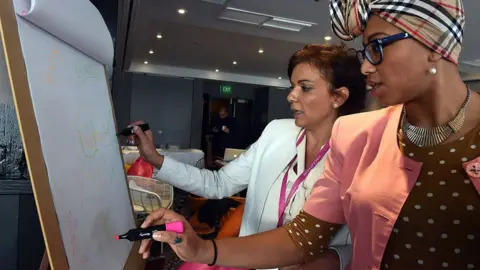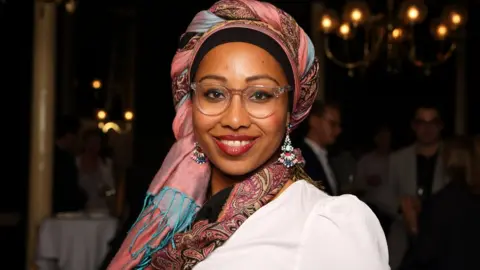The Anzac post, outrage and a debate about race
 Supplied
SuppliedAn Australian writer stirred anger with a controversial Facebook post about Anzac Day in April. Months later, the saga continues to provoke a much wider discussion, writes Kathy Marks in Sydney.
She is, by her own definition, "the perfect package for outrage" - a young, brown-skinned, feminist Muslim with outspoken opinions and the self-confidence to articulate them.
Even so, Yassmin Abdel-Magied could hardly have anticipated the ferocity, or the relentlessness, of the attacks which have rained on her in recent months. They have come from internet trolls, tabloid newspapers and even the Australian prime minister, culminating in the 26-year-old leaving the country.
How did the gifted writer and mechanical engineer - named Queensland's Young Australian of the Year in 2015 and who showcased Australian multiculturalism overseas at the request of the Department of Foreign Affairs (DFAT) - become a figure of hate, so reviled that a government senator urged her to "move to an Arab dictatorship", and a radio commentator "joked" about running her over?
Ostensibly, a series of controversies led to her excommunication. It began with a public spat with the US writer Lionel Shriver, and peaked when Sudanese-born Ms Abdel-Magied "desecrated", as some saw it, Australia's venerated Anzac Day holiday.
However, some suspect that the backlash - which has seen her receive daily death threats, as well as videos of rapes and beheadings - was less about what she did or said, than who she is and what she represents.
The unseemly saga, they say, reflects a coarsening of the national discourse on race.
Controversial post
Ms Abdel-Magied, whose family migrated to Australia when she was a baby, worked on offshore drilling rigs after graduating from the University of Queensland with first-class honours.
 Getty Images
Getty ImagesA committed Muslim with a passion for motorsports, she was named one of Australia's "Top 100 Most Influential Engineers", and appointed to the federal government's high-level Council for Australian-Arab Relations. She presented a programme, Australia Wide, on ABC TV, and wrote a well-received memoir.
At the Brisbane Writers Festival last September, Ms Abdel-Magied stormed out of a speech by Ms Shriver, affronted by her views on cultural appropriation. In February, on national TV, she defended Islam as "the most feminist religion".
While both incidents sparked a media frenzy, they were dwarfed in April by a Facebook post on Anzac Day, the anniversary of a major World War One battle fought by Australian and New Zealand troops in Turkey.
"LEST. WE. FORGET. (Manus, Nauru, Syria, Palestine...)," Ms Abdel-Magied wrote, in part referring to Australia's controversial detention of asylum seekers on remote Pacific islands.
Although she quickly deleted the post and apologised, all hell broke loose. Anzac Day is a sacred day to many Australians, reserved for remembering military sacrifice and not to be politicised.
Sydney tabloid the Daily Telegraph branded it "a sickening insult to the nation's war dead". Senior federal ministers, including the Prime Minister Malcolm Turnbull, lambasted her. A government backbencher, George Christensen, urged her to consider "self-deportation", and demanded the ABC sack her.
Social media fizzed with hate. Ms Abdel-Magied had to move house, and change her phone number. The ABC axed her programme, but insisted the move was unrelated to the Facebook post. Over the next two months, "almost 90,000 twisted words" were written about her, as she later recounted in The Guardian.
Free speech debate
Just as she resurfaced last month - "traumatised" at "being deemed the face of all that is evil", as she tweeted - another race-related row erupted. The catalyst was a submission by the Australian Human Rights Commission (AHRC) to a parliamentary inquiry into strengthening multiculturalism, noting the scarcity of non-Anglo-Celtic faces in public life.
Railing against the submission on Sky News, Rowan Dean, editor of The Spectator Australia, urged the federal Race Discrimination Commissioner, Tim Soutphommasane, to "hop on a plane and go back to Laos". (Mr Soutphommasane, born in France of Laotian parents, works for the AHRC.)
The focus then swung back to Ms Abdel-Magied, who had announced she was moving to London. Seven News ran an online poll: should she leave or "stay and face her critics"? (The TV network later removed it and apologised.) Radio commentator Prue MacSween declared that Ms Abdel-Magied - whom she called "this flea" - was justified in feeling "unsafe in her own country... because if I'd seen her, I would have been tempted to run her over".
 Seven News
Seven NewsAlthough her comments, and Mr Dean's, were criticised, the reaction was brief and muted - nothing like that triggered by the Anzac Day post.
Ironically, some of Ms Abdel-Magied's fiercest detractors have waged a long-running campaign to water down racial vilification laws, in the name of free speech. Earlier this week, in a panel organised by The Age newspaper, Ms Abdel-Magied asked: "Where were all the defenders of freedom of speech in my case?"
A leading expert on racism, Prof Andrew Jakubowicz, of the University of Technology Sydney, believes campaigners are constantly "pushing the limits of racist hate speech", and creating a climate in which such speech is considered permissible.
"You've got a Muslim woman of colour who is smart, educated and breaks all the stereotypes," he says. "That's the micro story. The macro story is the attempt to push back human rights protections in Australia."
According to government statistics, 28% of the Australian population was born overseas, and surveys suggest 85% of people support multiculturalism. "The paradox is that we're a success story of multiculturalism, but racism persists," Mr Soutphommasane told the BBC.
"One reason is that some people set a very high bar, only recognising racism if it involves Ku Klux Klan-style activities or institutional apartheid. So these outbursts are excused as ignorant or ill-judged."
Mr Soutphommasane warns of "a danger of racism and religious bigotry becoming normalised in public debate". Ominously, racist posters attacking Ms Abdel-Magied and a high-profile TV presenter, Waleed Aly, have appeared around Sydney.
For her part, Ms Abdel-Magied believes Australia "doesn't know how to have a nuanced conversation about race, or religion, for that matter".
 Yassmin Abdel-Magied
Yassmin Abdel-MagiedHer "crime", she suggests, was to stop being a model migrant, and "imagine I was Australian enough to be able to criticise Australia or contribute to public discussion on my own terms".
She told the BBC that while she appreciated the support she had received, "it's like trying to build a wall out of hay against a tsunami at the moment".
Criticism not uniform
Although the ABC noted in a statement following the Anzac Day furore that Ms Abdel-Magied had deleted the offending post and apologised, Julianne Schultz, editor of Australia's Griffith Review magazine, says she was "deeply disappointed that neither the ABC nor DFAT defended or protected her when she was under daily attack, despite her institutional attachment to them making her more of a target".
Their silence, says Ms Schultz, who first published Ms Abdel-Magied's writing, "really spoke to an intimidated public culture in which bullies prevailed".
Not everyone is so sympathetic. Amanda Vanstone, a former federal minister, wrote in Fairfax newspapers that since Anzac Day was an occasion to "remind ourselves of the enormous human cost of war", the Facebook post "was inevitably going to cause offence and controversy".
She added: "Many find it difficult to accept that she didn't understand that at the time."
"Abdel-Magied has a public position and chooses to have a public profile. It's no surprise that what she puts out in the public domain draws comment from others."
Many observers, though, are disappointed that the politicians who so vehemently condemned Ms Abdel-Magied did not take Mr Dean or Ms MacSween to task for their inflammatory comments.
As Mr Soutphommasane says: "The tone of our public debate is set by our political leadership."
